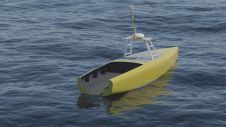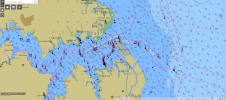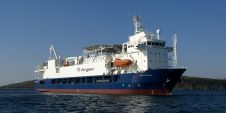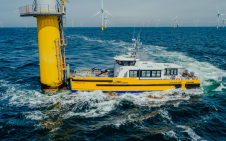Hydrographic Society Benelux
On Friday 22nd September the regular workshop of the Hydrographic Society Benelux (HSB) was hosted by the Shipping and Transport College (STC) in Rotterdam. This new building on the edge of Rotterdam Harbour houses a college for education in all aspects of shipping and transport. The workshop started with a short obituary for Cor Don, former president of the HSB. Cor played a major role in the forming of the International Federation of Hydrographic Societies and made the HSB an active and healthy society.
The main topic of the workshop was hydrographic education: the connection between education to the professional field, and the need to increase the influx of new students. Before the break three presentations were given. Willem Nowé of the STC-group presented a new programme of education for surveyors at Class-B level of IHO Standards of competence. Particularly within the Netherlands, he said, there was a need for basic professional skills at this level. The STC-group is now obtaining the international accreditation for this school. Luc Boehme gave the second presentation. He is a staff member at the Katholieke Hogeschool Brugge Oostende (KHBO) in Flanders. Here there is no separate education for the surveyor. Students can graduate in Hydrography from the faculties of Geodesy and Civil Engineering (both BSc and MSc level). Rob van Ree heads the Hydrographic Department of the Maritime Institute Willem Barentsz on Terschelling in the Netherlands. This school trains surveyors to IHO Class-A level. The four-year course includes all aspects of hydrography, with a lot of practical training onboard the vessel belonging to the school, the MS Octans.
After a break, further discussions took place on the workshop topic. The members of the forum were Willem Nowé (STC-group), Rob van Ree (Maritime Institute Willem Barentsz), Alain de Wulf (University of Ghent), Johan Stam (DOOR/Skilltrade), Sjoerd van den Brom (Boskalis) and Matthijs de Lange (Sea Academy). One major challenges facing hydrographic education is its connection to the professional field. Sjoerd van den Brom argued that the dredging industry preferred to employ Class-A surveyors because the job requires all-round surveyors who can work independently under difficult circumstances and know how the dredging process works. Class-B surveyors are usually recruited locally. Willem Nowé mentioned an STC market study showing that Class-B surveyors were also needed. He saw the education at STC as a good starting point for a career in the hydrographic field.
Another topic for discussion was the need for a higher influx of new students. All participants and audience were agreed on the need to attend to this problem. The industry, in co-operation with government agencies and schools, has set up a feedback group for hydrography to promote the hydrographic profession. A website has been set up, maintained by students, and promotional material has also been produced for use by the schools. All forum members agreed that co-operation between the different schools and colleges was needed, but they felt that the setting up of a European Hydrographic Academy, as suggested by Luc Boehme, would probably encounter a lot of practical obstacles.
The workshop showed the enthusiasm of attendees for hydrography. It was closed with an informal drink, overlooking Rotterdam harbour.
Contact
Please find the contact details of the Hydrographic Society Benelux.

Value staying current with hydrography?
Stay on the map with our expertly curated newsletters.
We provide educational insights, industry updates, and inspiring stories from the world of hydrography to help you learn, grow, and navigate your field with confidence. Don't miss out - subscribe today and ensure you're always informed, educated, and inspired by the latest in hydrographic technology and research.
Choose your newsletter(s)
























